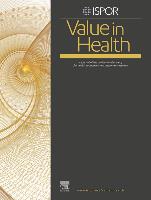A Report of the ISPOR Nutrition Economics Special Interest Group
 Lawrenceville, NJ, USA—May 4, 2022—Value in Health, the official journal of ISPOR—the professional society for health economics and outcomes research, announced today the publication of a report showing that most countries provide limited medical nutrition reimbursement, have not updated reimbursement policies, and lack health technology assessment for medical nutrition technologies. The report, “Are We Ready for a New Approach to Comparing Coverage and Reimbursement Policies for Medical Nutrition in Key Markets: An ISPOR Special Interest Group Report,” was published in the May 2022 issue of Value in Health.
Lawrenceville, NJ, USA—May 4, 2022—Value in Health, the official journal of ISPOR—the professional society for health economics and outcomes research, announced today the publication of a report showing that most countries provide limited medical nutrition reimbursement, have not updated reimbursement policies, and lack health technology assessment for medical nutrition technologies. The report, “Are We Ready for a New Approach to Comparing Coverage and Reimbursement Policies for Medical Nutrition in Key Markets: An ISPOR Special Interest Group Report,” was published in the May 2022 issue of Value in Health.
Medical nutrition comprises enteral nutrition (including orally nutritional supplements and enteral tube feedings into the digestive tract) as well as parenteral nutrition, which is administered intravenously. “Disease-related malnutrition has many deleterious consequences on several clinical, functional, and economic outcomes,” said the report authors. “Recovery from disease, injury, and surgery is impaired, increasing mortality and complications. Disease-related malnutrition subsequently results in increased healthcare resource use across different age groups, such as increased length of hospital stay, increased readmissions, and more care needed following hospital discharge.”
In keeping with its mission to develop a systematic approach for the assessment of nutrition in outcomes research, ISPOR’s Nutrition Economics Special Interest Group undertook this international review of government policy and regulatory norms within a generalizable sample of industrialized countries to characterize the coverage and reimbursement of medical nutrition across a diverse set of countries. A final group of 14 countries (ie, Australia, Belgium, Brazil, Canada, China (including Hong Kong, Macau), France, The Netherlands, Germany, Italy, Japan, Singapore, Spain, United Kingdom, and the United States) was selected for data extraction based on the expertise of the writing team.
“There is a growing body of evidence from individual studies and meta-analyses demonstrating the benefits of enteral medical nutrition in improving nutritional status, reducing adverse health outcomes, and reducing the economic burden of malnutrition on society,” said the authors. “Healthcare policy makers should ensure optimal patient access to medical nutrition as part of the management of nutrition-related disorders and conditions, but questions remain whether current healthcare policies reflect the clinical and economic benefits of medical nutrition.”
Unfortunately, the research showed that most countries provide little or no reimbursement for medical nutrition products for individuals living in the outpatient or community setting despite these products having a positive impact on patient outcomes and being cost effective—and even cost-saving in some cases—as part of the total management of patients suffering from malnutrition. Additionally, there are numerous differences between the conditions eligible for reimbursement between countries. For example, only malnourished patients are reimbursed in France, whereas in Australia, only specific populations such as retired army veterans are eligible for enteral medical nutrition reimbursement. For some individuals excluded from reimbursement, the use of medical nutrition as a sole source of nutrition via feeding tubes or oral routes (eg, malabsorptive diseases, nonresectable gastrointestinal tumors) is essential for survival. These limitations may lead to suboptimal access to medical nutrition technologies where they are indicated to manage nutrition-related disorders and conditions, with the potential of negatively impacting patient and healthcare system outcomes.
“Despite the increasing evidence on the clinical and economic benefits of enteral medical nutrition, reimbursement varied widely among countries and settings, and in many countries reimbursement was limited either to specific diseases or conditions or specific subsets of patients,” the authors concluded. “Only 11 of the 14 countries reviewed had coverage policy established for these products. Furthermore, policies regulating coverage and reimbursement have not been updated in many years, and they do not account for the demonstrated positive health outcomes of medical nutrition products, resulting in significant potential economic harm to the healthcare systems. Additionally, coverage varied between complete and noncomplete formulas, for enteral tube feeding formulas, and orally nutritional supplements. Based on all the available evidence, standard listing of enteral medical nutrition should be considered in reimbursement procedures.”
###
ABOUT ISPOR
ISPOR, the professional society for health economics and outcomes research (HEOR), is an international, multistakeholder, nonprofit dedicated to advancing HEOR excellence to improve decision making for health globally. The Society is the leading source for scientific conferences, peer-reviewed and MEDLINE®-indexed publications, good practices guidance, education, collaboration, and tools/resources in the field.
Website | LinkedIn | Twitter (@ispororg) | YouTube | Facebook | Instagram
ABOUT VALUE IN HEALTH
Value in Health (ISSN 1098-3015) is an international, indexed journal that publishes original research and health policy articles that advance the field of health economics and outcomes research to help healthcare leaders make evidence-based decisions. The journal’s 2020 impact factor score is 5.725 and its 5-year impact factor score is 6.932. Value in Health is ranked 4th of 98 journals in health policy and services, 9th of 108 journals in healthcare sciences and services, and 24th of 376 journals in economics. Value in Health is a monthly publication that circulates to more than 10,000 readers around the world.
Website | Twitter (@isporjournals)